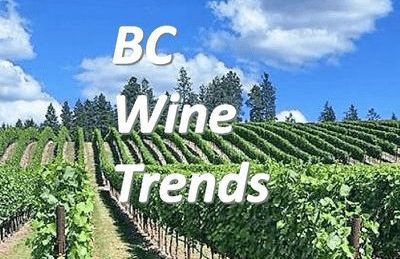2017 was a year of high drama for the wine industry in many parts of British Columbia. Floods followed by wildfires and smoke impacted the tourists travelling to BC wine country. This resulted in less direct sales from wineries. Now is the time to look into our crystal ball and see what to expect for the 2018 Wine Trends.
Millennials Drive 2018 Wine Trends
Millennials care little about the origin or vintage of the wine they drink. They’re more interested in the experience of wine. They take a huge interest in new wines and wines from regions they may not be familiar with¹. Millennials are more likely to be attracted to a blog, social media recommendations from friends or wine apps. Interactive wine apps like Natdecants, Vivino and Delectable have a significant role to play and are gaining in popularity.
There are six primary traits that define the Millennial Generation
- They are tech savvy (100% internet ownership),
- Embrace diversity,
- They find value in fun,
- Optimistic yet practical,
- Are environmentally and socially conscious, and
- They have entrepreneurial spirits.
By getting to know the millennial wine consumer, wineries can learn how to meet their needs and expectations. Aside from being intelligent consumers, the millennial generation also embraces diversity. Social Media marketing and wine labelling that promotes the wine brand as hip and edgy, yet classic are keys to success with this demographic.
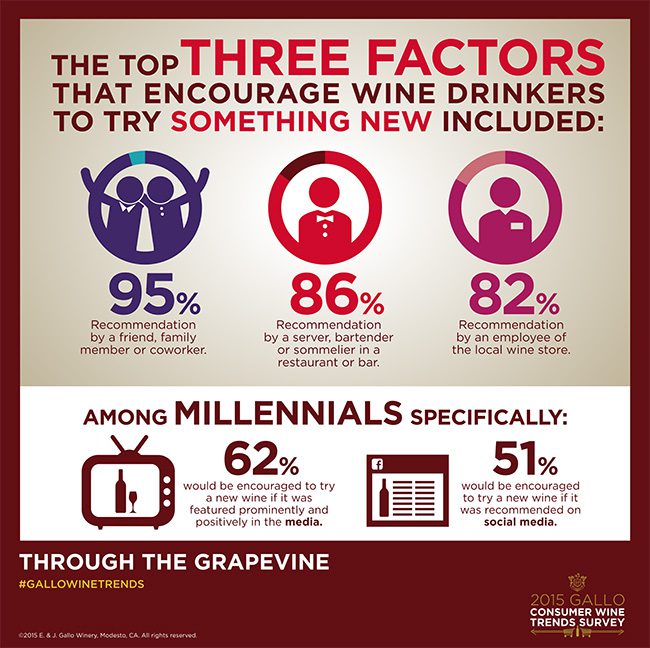
Premium Wine Growth
The desire to try a more premium product and pay more for it or “premiumization” is expected to continue in 2018 for wine and other alcoholic beverages. “Buying up” is often an easier sell at restaurants than wine sellers, where drinkers are looking more for an exciting and elevated experience than simply purchasing a bottle to unwind with after work. A higher consumer confidence rating in 2018 means consumers will continue to trade up to more expensive wines.
Premiumization is definitely happening in the rosé segment. The growth of rosé is beginning to wane. Which isn’t a necessarily a surprise, given that the explosive rise of the pink stuff couldn’t be sustained forever. In the US, rosé from the Provence region of France continues to grow. Provençal rosé is light and crisp, without the soft fruits found in many of its North American counterparts. I would expect many BC producers to concentrate more on Provence style rosés.
Sparkling wines
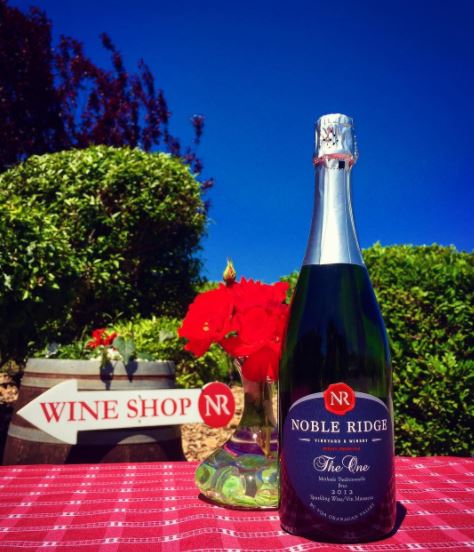
Prosecco sales have gone through the roof in the United States, and it’s millennials who seem to be behind Prosecco’s rise. This trend has spilt over to BC and with affordable Prosecco fueling growth in the whole sparkling wine segment. For example, Fitzpatrick Vineyards opening this year in Peachland with a dominant sparkling wine offering.
Red Blends
One of the reasons this category is set up for continued growth is how open and freewheeling a category it is. Red blends offer a perfect palette for winemakers to mix grapes, blending, and mimic other styles³.
Millennial wine drinkers are not as hung up on wine traditions, or even on knowing how to pronounce certain grape varieties. Many are turned off or intimidated by them. Red blends, bearing easy-to-pronounce, familiar-sounding names, remove that intimidation factor.
More Acquisitions?
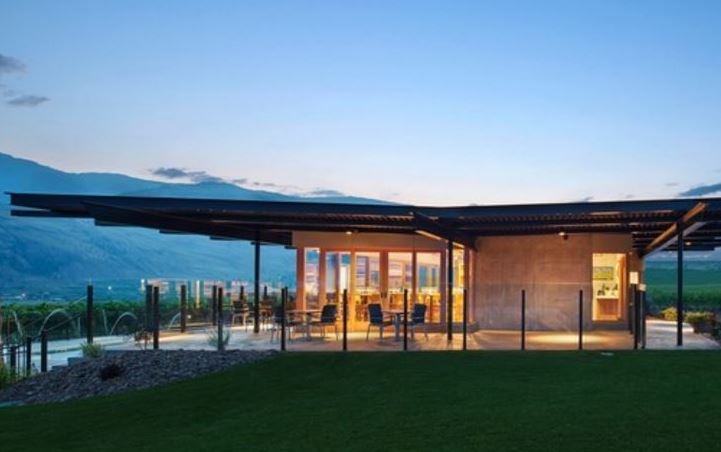
Are Ontario corporations taking over control of the BC Wine industry? In September, Andrew Peller Ltd. signed deals to acquire three B.C. wineries for a combined price of $95 million. The Ontario-based wine producer signed definitive agreements to acquire Black Hills Estate Winery, Gray Monk Estate Winery and Tinhorn Creek Vineyards.
In November, Arterra Wines Canada Inc., which was formerly known as Constellation Brands Canada, announced that it is buying 14-year-old Laughing Stock Vineyards from owners David and Cynthia Enns, who will stay on for at least two years and run the winery. Arterra operates about 1,200 acres of vineyards in BC. Arterra already owns Jackson-Triggs, Black Sage Vineyards, Sumac Ridge, See Ya Later Ranch, Inniskillin Okanagan and 50% of Nk’Mip Cellars.
Many winemakers have commented that the acquisition climate, funded in part by Chinese money, is leading to a tighter grape supply. Average grape prices were ~15% higher for the 2017 harvest. The small and medium wineries will really need to concentrate on their relationship with their growers to protect their supply. Bulk BC red wine supplies are already tight. Consumers should expect price increases for the 2017 reds when they are released.
Given the high cost of wine production in BC and the current investment climate, more consolidation in 2018 is expected.
Grocery Store Channel Expands
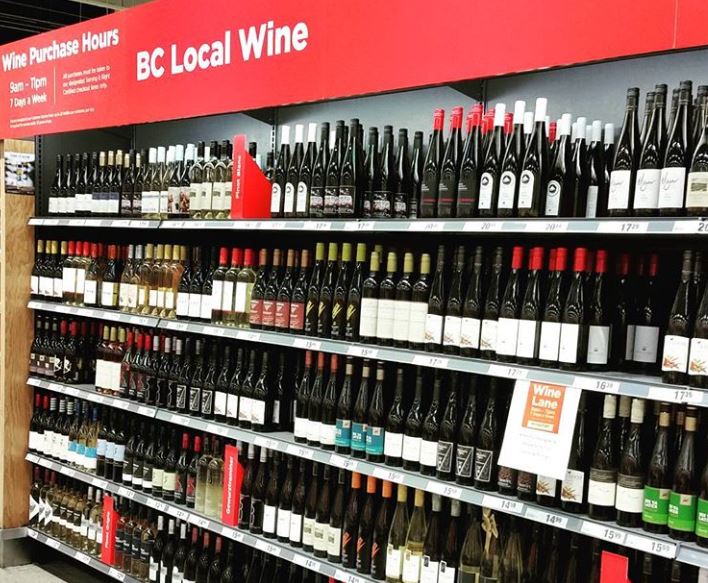
BC Wines sales in grocery stores are becoming a more significant distribution channel. In Kelowna, the Real Canadian Superstore opened their “winelane” in November. Save-On-Foods now sell wine in 15 BC locations. There are differences in their approach with so far only Save-On-Foods providing knowledgeable wine staff to assist consumers.
Vancouver remains the outlier for Grocery sales. The Vancouver City Council decided on December 16, 2015, to temporarily hold off on grocery store wine sales until a larger review is conducted. This means Vancouverites will have to be content with government liquor stores, private liquor stores, and a decreasing number of VQA wine stores, for the time being.
The current WTO dispute with the US and other trading partners over exclusive BC wine sales in grocery stores is a concern. Will this lead to an end of BC wines’ competitive advantage and cheap international wine also being sold in grocery stores?
Marijuana – The Wild Card
The Canadian federal government’s plan to legalize marijuana by next summer is a step closer. Bill C-45 received final approval on November 27th in the House of Commons, passing by a vote of 200-82. It now moves to the Senate, where Conservative senators are threatening to hold up passage of the bill.
Assuming marijuana is legal in BC by next summer, and that is still a big IF, the impact on low-end wine sales would be significant. For example, “A study from OutCo and Monocle Research shows 51% of millennials in California will replace alcohol with marijuana.” <5>. “Millennials will be more open to diversity in their consumption of recreational substances than older generations, with more than 50% of them substituting cannabis for alcohol altogether. The study further shows that one in five Generation Xers will be substituting marijuana for alcohol and so will 8% of baby boomers.”
Your comments on 2018 Wine Trends
Please leave your thoughts on the 2018 Wine Trends in the comment section below. Have we missed the next big thing?
References:
- Millennials, apps and the next big thing in wine – according to leading influencer
- Designing Wine Labels for the Millennial Generation
- State of the Bar: 2018 Wine Trends
- The Future is Bright for US Wine in 2017: Statistics from 2016 Paint Rosy Picture
- Marijuana’s Impact on Wine Sale — Bad or Terrible?
